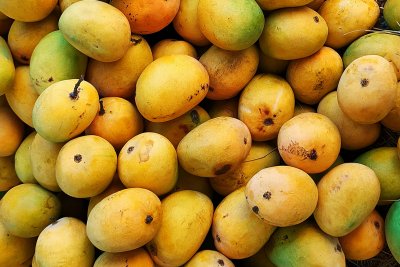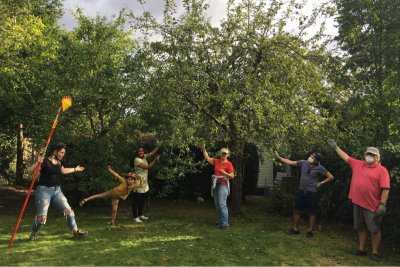 Alphonso mangoes. Credit: Manoj Patil, Pexels
Alphonso mangoes. Credit: Manoj Patil, Pexels

More than mangoes: a story of love, migration and identity
One purpose of The Gathering Table: a summit on racial justice in food and farming that took place in Bristol in June, was to start building connections through our shared food stories. So here's one from our Diversity Outreach Coordinator, Roshni Shah.
Welcome to the second of The Gathering Table round ups.
Read on to learn Roshni Shah's personal food story, the same one she chose to open up the summit with, and see why there is so much more to mangoes than meets the eye.
The opening story of The Gathering Table: a summit on racial juctice in food and farming by Roshni Shah
Today I am sharing my own food story. And I want to begin with a fruit. A fruit that I love so much I even have it tattooed on my body. The mango. Specifically, sweet sweet Indian mangoes.
For some, mangoes are just a delicious, juicy treat. But for me, mangoes are memory. They are heritage, they are migration, and they are love.
My love for food developed as a girl. I am an only child, which meant I spent a lot of time with my mum. A mum who was incredible at cooking. I remember her cracking coconuts with a hammer, spending hours sorting through lentils and showing me how to shell fresh peas. But my favourite memory is discovering mangoes. Juicy, golden Alphonsos from India, bought and devoured by the box.

Alphonso mangoes taught me my first lessons in seasonality. Alphonsos make you wait. You can only enjoy them in their own time; from April until July if you are lucky. No substitutes, no shortcuts. And because the season is fleeting, you savour every mouthful. Mango season is a celebration.
There is an eagerness with which I still call my dad as mid April hits - Is it time? Are they there? (at the Indian shop). I have a confession to make. I’m 42 years old and my dad still buys me my mangoes.
So mangoes have become a lesson in love. As a young girl, I remember my mum cutting them into slices and squeezing the pulp to make thick mango juice to eat alongside chapattis. For my parents, sharing mangoes with me is a bridge to our shared homeland(s), connecting me back to my heritage. And they are how I show love too. I often gift mangoes to my friends or share them to say thank you for a favour.
So, when I think of mangoes, I think of connection. But their resonance goes deeper.
Originating in India. I can trace the parallels between their migration and my own family’s. From India to Kenya to the UK. A journey, not entirely made by choice, but a path carved by colonialism.
My parents and grandparents before them sought better opportunities in new countries because their existing lands had been stripped back. And as was their right a citizens of the ‘commonwealth’. The British Empire disrupted and destroyed lives and livelihoods across global majority countries. In India, it fractured food systems, seized land and extracted resources, exploiting the labour of Indian people. Many surviving families were pushed to seek opportunities elsewhere.
In Kenya, many Indians became part of a vast system of indentured labour, brought over to build railways, manage colonial trade, and support imperial economies. Later, amid growing political unrest and anti-Asian sentiment, some moved again, this time to Britain, seeking refuge in a place that promised safety, but didn’t always offer belonging. So they sought comfort in the food of their homelands.
And just like people, mangoes have travelled across the empire. Carried in part by colonial trade routes and botanical gardens, mango seeds and saplings were spread from India to East Africa, the Caribbean, Southeast Asia, South America and beyond.
As diasporic communities, food for us became more than nourishment. It was a way of remembering who we were, and where we came from, in places that often tried to make us forget. So when I hold a mango, I’m holding 4,000 years of history. I’m holding a symbol of identity, culture, resilience, and survival.
Food is never just food. It’s shaped by power. It reflects who has land, who gets fed, and who gets erased.
That’s what led me to this work. A lifelong love of food, forged with a deep connection to community and a passion for justice; reflecting on the privilege I have had to grow up with love, with nourishment and community but recognising the path that led my family here.
We know that the legacies of our colonial past still linger in who owns land, whose food knowledge is valued, whose labour is exploited, and who makes the decisions.
So I welcome you into this space today to think about how we begin to shift that power, centre marginalised voices and reimagine our systems for a just food future.
What is your food story?
Resources & get involved
Use this template to create your own food story.
Read our overview of the summit here.
If you are working on justice issues and are are interested in joining our food and racial justice working work, please fill in this form.
Follow us over the coming weeks as we publish deeper dives into the sessions and share resources, reflections, and ways to get involved.
Sustain: Sustain The alliance for better food and farming advocates food and agriculture policies and practices that enhance the health and welfare of people and animals, improve the working and living environment, enrich society and culture and promote equity.
Sustain
The Green House
244-254 Cambridge Heath Road
London E2 9DA
020 3559 6777
sustain@sustainweb.org
Sustain advocates food and agriculture policies and practices that enhance the health and welfare of people and animals, improve the working and living environment, promote equity and enrich society and culture.
© Sustain 2026
Registered charity (no. 1018643)
Data privacy & cookies
Icons by Icons8







